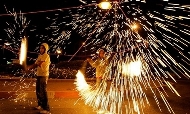On walls in Nablus there's a shaheed poster -- a poster commemorating a martyr killed by the Israeli army -- showing a middle-aged man standing in front of an ambulance. We're told he was the head of the ambulance Service in Jenin. During the reoccupation of Jenin by the Israeli army, when a convoy of ambulances went to pick up people who had been wounded or killed, the Israeli army energy-bombed the ambulances. An energy bomb is an incendiary device, which vaporizes everything around it with fire. After the bomb, there was nothing left of his body. Palestinians, trying to explain it, point to the ashes of a cigarette.
Palestinian ambulances, ambulance drivers and EMTs are under constant attack by the Israeli army -- in spite of international law which says that people have a human right to health care, and that health care workers must be allowed to provide it.
Because of their protected status, ambulances are the only vehicles technically allowed on the roads during curfew. Especially under curfew, ambulances have become essential to every aspect of health care. People can't leave their homes to buy medicine, and they can't travel to the hospital for urgent outpatient care like dialysis. People who care for elderly or ill family members can't get to them. People who are discharged from the hospital after an illness can't get home. So ambulances have become the conduit for all health care, and they are constantly out on the road trying to make sure Palestinians survive. This is in addition to the continued need for emergency service, which is exacerbated by semi-daily shootings of Palestinian civilians by the Israeli army.
But every minute that a Palestinian ambulance is on the road or Attending to a patient is dangerous. Although the Israeli army is forced to allow ambulances on the roads, soldiers take every opportunity to impede them, and to ensure that health care workers know they are unsafe. Every roving tank that crosses an ambulance's path stops the ambulance. At every check point(which is not just one blockade on a road, but two, with the army controlling the space between), ambulances are stopped and may be delayed for hours, and then may be stopped and delayed again 100ft later at the other side of the checkpoint.
When internationals are present, stopping an ambulance means checking the ID of everyone on board, including patients; searching the ambulance; searching the EMTs and possibly the patients; and waiting. The ambulance can't move until the army says it can. Often, the soldiers just stand there, delaying it.
When internationals are not present, stopping an ambulance may mean doing all of the above, possibly strip-searching the EMTs, possibly beating them, possibly damaging the ambulance, and randomly delaying for hours.
These criminal violations by the Israeli army of the right to health care are only *part* of the incredible stress endured by EMTs. Many EMTs are young volunteers, in their early 20s, who have been living full-time at the ambulance depots for months, sleeping on mattresses on the floor between long shifts. Especially under curfew, there's little else to do - no other work, no school, no place to decompress. So, in addition to spirit-crushing 24-hour curfew and the daily threat of violence directed at their bodies both as Palestinians and EMTs, they face the stress of being medics in a war zone, having no place to go "home for a break", no time for vacation, no foreseeable end to their tour of duty, witnessing daily military violence visited on their own community and land, and daily having to fight to get basic treatment to members of their community who need it.
To me, as an American Jew trying to understand how Palestinians are surviving this intense psychological and physical battering, it looks like amazing spirit of resistance combined with zombified carrying-on-with-life. But the truth is, I have no idea how they're doing it. We have the same questions about how Jews, queers and others survived in WWII concentration camps. How much deliberate crushing can a people take and still be alive? Some people survived the concentration camps, but not everyone came out whole. Although for some Jews that experience reinforced the need to fight oppression, others have clearly lost their sense of justice, turning to violence and conquest. Will Palestinians be like those survivors in 50 years, using past suffering to justify evil acts? I hope not - they aren't yet.





